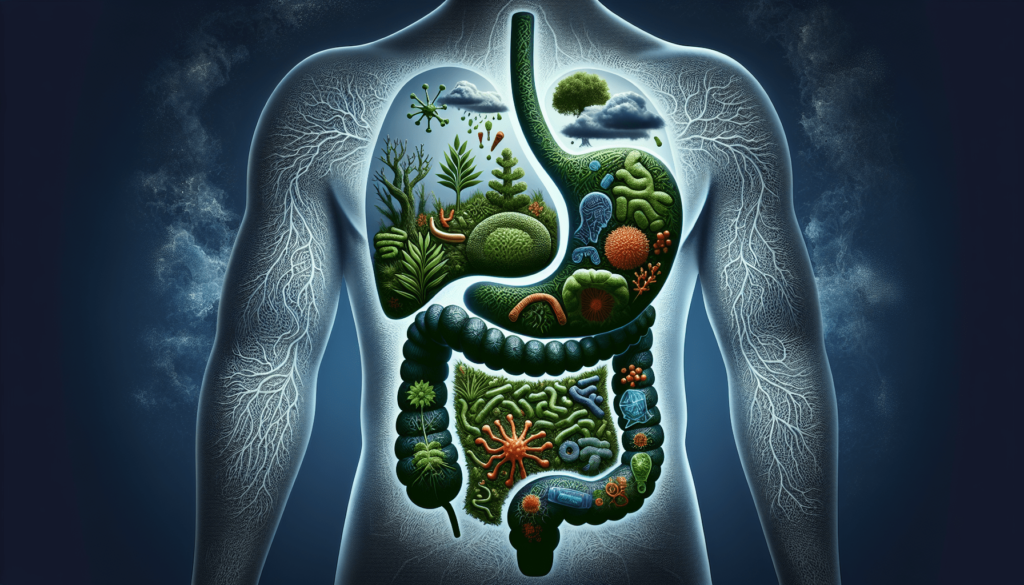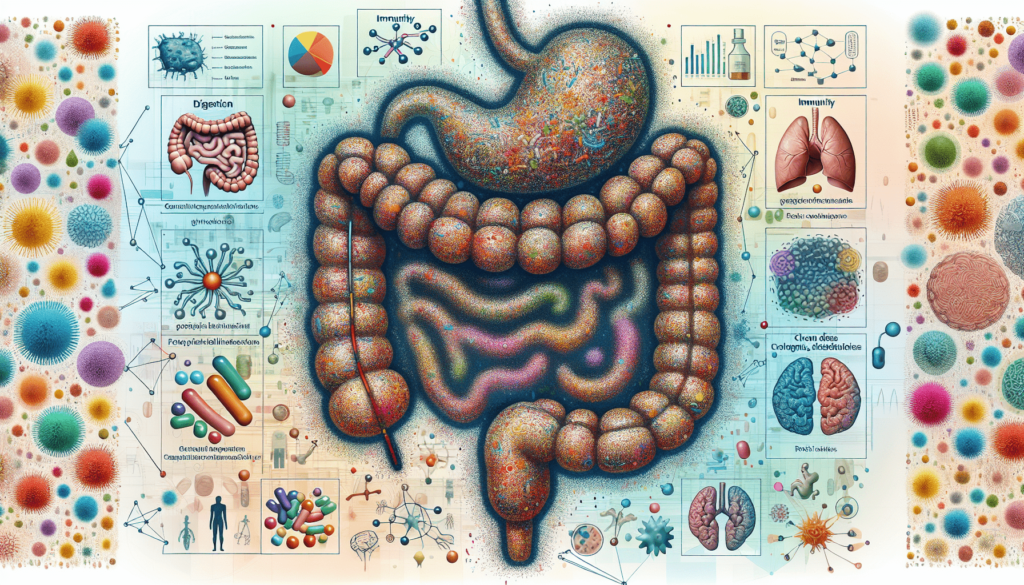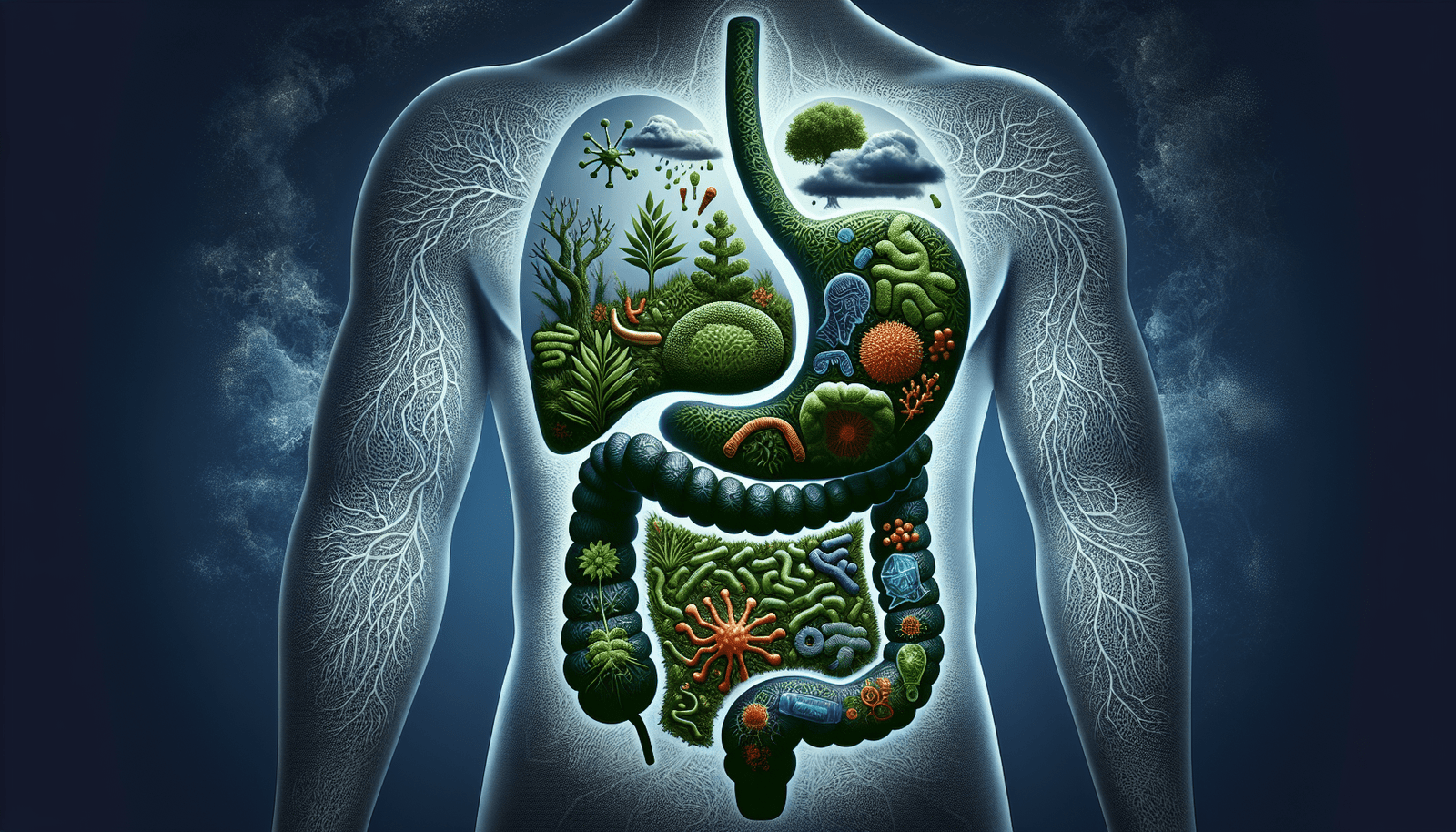In this article, you will gain a deeper insight into the fascinating world of the microbiome and its implications for gut health and beyond. Discover how this intricate ecosystem of bacteria, viruses, and fungi in and on our bodies plays a vital role in regulating our immune system, metabolism, and overall well-being. Get ready to explore the amazing potential of harnessing the power of your microbiome for a healthier and happier future. So, grab a cup of tea, sit back, and embark on this journey of discovery.

What is the Microbiome?
The microbiome refers to the collection of microorganisms, including bacteria, fungi, viruses, and other microbes, that inhabit various parts of your body. These microorganisms are not harmful pathogens, but rather play important roles in maintaining your overall health. The microbiome is unique to each individual, and it is influenced by a variety of factors such as genetics, diet, lifestyle, and environmental exposure.
Composition
The microbiome is mainly composed of bacteria, which are the most abundant microorganisms present in the human body. These bacteria can be further classified into different types, known as phyla, with the most dominant phyla in the gut microbiome being Firmicutes and Bacteroidetes. Other microorganisms, such as fungi and viruses, also make up a smaller portion of the microbiome.
Functions
The microbiome performs a range of vital functions that are essential for your overall health and well-being. One of its primary functions is aiding in digestion and nutrient absorption. Certain bacteria in the gut microbiome help break down complex carbohydrates and fiber that our body cannot digest on its own, allowing us to obtain energy from these otherwise indigestible substances.
Additionally, the microbiome plays a crucial role in supporting a healthy immune system. The presence of beneficial bacteria in the gut helps fight off harmful pathogens and strengthens the body’s defense against infections and diseases.
Furthermore, research has shown that the microbiome influences various other body systems, including the skin, mental health, immune system, and metabolic health. Understanding these connections is crucial for maintaining a healthy microbiome and preventing or managing various diseases and disorders.
Gut Health
Importance of a Healthy Gut
Having a healthy gut is essential for overall well-being. The gut serves as a hub for many essential bodily functions, including digestion, nutrient absorption, and waste elimination. When your gut is healthy, it promotes a smooth and efficient digestive process, allowing your body to absorb essential nutrients from the food you eat.
A healthy gut also helps maintain a robust immune system by keeping harmful pathogens in check. It prevents the overgrowth of harmful bacteria and promotes the growth of beneficial bacteria, which play a vital role in supporting immune function.
Furthermore, a healthy gut is linked to better mental health. The gut and brain are connected through the gut-brain axis, and an imbalance in the gut microbiome can lead to mental health issues such as anxiety and depression. Therefore, maintaining a healthy gut is crucial for both physical and mental well-being.
Factors Affecting Gut Health
Several factors can impact the health of your gut microbiome. One of the most significant factors is diet. A diet high in processed foods, sugar, and unhealthy fats can negatively affect the diversity and balance of your gut bacteria, leading to an unhealthy gut. On the other hand, a diet rich in fiber, whole grains, fruits, and vegetables promotes a healthy gut by providing beneficial nutrients and promoting the growth of good bacteria.
Other factors that can affect gut health include stress levels, medications, such as antibiotics and proton pump inhibitors, and environmental factors, such as pollution and exposure to toxins.
Role of the Microbiome in Gut Health
The microbiome plays a crucial role in maintaining gut health. The beneficial bacteria in the gut microbiome help protect the gut lining, prevent the growth of harmful bacteria, and maintain a healthy balance of microorganisms.
These beneficial bacteria also produce short-chain fatty acids (SCFAs), which nourish the cells lining the colon and support their overall health. SCFAs also have anti-inflammatory properties and promote a healthy immune response.
When the diversity or balance of the gut microbiome is disrupted, it can lead to dysbiosis, a condition characterized by an imbalance in gut bacteria. Dysbiosis has been linked to various gut-related disorders, such as inflammatory bowel disease (IBD), irritable bowel syndrome (IBS), and colorectal cancer. Therefore, maintaining a healthy microbiome is essential for the prevention and management of gut-related disorders.
Beyond the Gut: Other Body Systems Affected by the Microbiome
While the gut microbiome is best known for its role in digestion and gut health, its influence extends far beyond the gut. Emerging research has revealed that the microbiome has a significant impact on various other body systems, including the skin, mental health, immune system, and metabolic health.
Skin Health
The microbiome has been found to play a crucial role in maintaining a healthy skin barrier and preventing skin disorders. Beneficial bacteria on the skin’s surface help protect against harmful pathogens, reduce inflammation, and promote wound healing. Disruptions in the skin microbiome have been linked to various skin conditions, including acne, eczema, and rosacea.
Mental Health
The gut-brain axis refers to the bidirectional communication between the gut and the brain. Emerging evidence suggests that the microbiome plays a vital role in this communication and can influence mental health and emotional well-being. An imbalance in the gut microbiome has been linked to conditions such as anxiety, depression, and even neurodevelopmental disorders like autism spectrum disorder.
Immune System
The gut microbiome is closely intertwined with the immune system. The presence of beneficial bacteria in the gut helps educate and regulate the immune system, ensuring an appropriate response to harmful pathogens while preventing unnecessary inflammation or autoimmune reactions. Disruptions in the gut microbiome have been associated with increased susceptibility to infections, allergies, and autoimmune diseases.
Metabolic Health
The microbiome has been implicated in the regulation of metabolism and body weight. Research has shown that individuals with obesity tend to have a different composition of gut bacteria compared to lean individuals. Alterations in the gut microbiome can affect the way our bodies metabolize food, leading to weight gain and metabolic disorders such as type 2 diabetes and cardiovascular disease.
The Gut-Brain Connection
How the Gut and Brain Communicate
The gut and brain are connected through a complex network of communication channels known as the gut-brain axis. This bidirectional communication occurs through various pathways, including the nervous system, immune system, and endocrine system.
The vagus nerve, which runs from the brainstem to the gut, is a key component of this communication network. It enables direct signaling between the gut and the brain, allowing them to influence each other’s functions and responses.
Additionally, the gut microbiome produces neurotransmitters, such as serotonin and gamma-aminobutyric acid (GABA), which can influence mood, cognition, and behavior. These neurotransmitters are then transported to the brain, impacting the way we think and feel.
Effects of the Microbiome on Mental Health
Research has shown that alterations in the gut microbiome can affect mental health and contribute to the development of mood disorders such as anxiety and depression.
The gut bacteria produce certain metabolites, such as SCFAs and neurotransmitters, that can directly influence brain function and mood. They can also modulate the immune system and regulate inflammation, which can have indirect effects on mental health.
Furthermore, the gut microbiome can influence the levels of stress hormones, such as cortisol, and play a role in the body’s stress response. Imbalances in the gut microbiome can disrupt this stress response system, leading to heightened anxiety and increased vulnerability to stress.
The Role of Gut Health in Neurological Disorders
Emerging evidence suggests that the gut microbiome may play a role in the development and progression of neurological disorders, including Alzheimer’s disease, Parkinson’s disease, and multiple sclerosis.
Research has shown that individuals with these disorders tend to have alterations in their gut microbiome compared to healthy individuals. These alterations can affect the production of metabolites that are important for brain health and function.
Furthermore, inflammation and immune dysregulation, which are associated with certain neurological disorders, can be influenced by the gut microbiome. By promoting a healthy gut and maintaining a diverse microbiome, it may be possible to support brain health and reduce the risk of these neurological disorders.

Factors Influencing the Microbiome
The composition and diversity of the microbiome can be influenced by various factors, including diet, antibiotics, stress, exercise, and environmental factors.
Diet
Diet plays a significant role in shaping the composition of the microbiome. A diet that is high in fiber, whole grains, fruits, and vegetables provides the necessary nutrients to support the growth of beneficial bacteria in the gut. On the other hand, a diet that is high in processed foods, sugar, and unhealthy fats can promote the growth of harmful bacteria and disrupt the balance of the microbiome.
Antibiotics
While antibiotics are essential for treating bacterial infections, they can also have a significant impact on the microbiome. Antibiotics are designed to kill bacteria, and while they may target harmful bacteria, they can also eliminate beneficial bacteria in the process. This disruption in the microbiome can lead to dysbiosis and increase the risk of infections and other health issues.
Stress
Stress has been shown to influence the composition and diversity of the microbiome. Chronic stress can disrupt the balance of the microbiome and promote the growth of harmful bacteria. Conversely, a healthy gut microbiome can help regulate the body’s stress response and promote resilience to stress.
Exercise
Regular exercise has been found to have a positive impact on the diversity and composition of the microbiome. Exercise promotes a healthy gut environment by increasing microbial diversity and promoting the growth of beneficial bacteria. Additionally, exercise has been shown to reduce inflammation and support overall gut health.
Environmental Factors
Environmental factors, such as pollution and exposure to toxins, can also affect the microbiome. Studies have found that individuals living in urban areas with high pollution levels tend to have less diverse microbiomes compared to those living in rural environments. Exposure to toxins, such as heavy metals and pesticides, can also disrupt the balance of the microbiome and impact overall health.
Maintaining a Healthy Microbiome
Maintaining a healthy microbiome is crucial for promoting overall health and preventing the onset of various diseases and disorders. Here are some strategies to support a healthy microbiome:
Dietary Recommendations
Aim to incorporate a diverse range of fruits, vegetables, whole grains, and legumes into your diet. These foods are rich in fiber, which serves as fuel for the beneficial bacteria in the gut. Fermented foods, such as yogurt, kefir, sauerkraut, and kimchi, are also beneficial as they contain live bacteria cultures that can help replenish and diversify the microbiome.
Probiotics and Prebiotics
Probiotics are live bacteria or yeasts that can be consumed through supplements or certain foods. They can help introduce beneficial bacteria into the gut and support a healthy microbiome. Prebiotics, on the other hand, are non-digestible fibers that promote the growth of beneficial bacteria. They can be found in foods such as onions, garlic, bananas, and asparagus.
Lifestyle Changes
In addition to a healthy diet, making positive lifestyle changes can have a significant impact on the microbiome. Managing stress levels through practices like meditation, yoga, or regular exercise can help support a healthy gut. Getting enough sleep and maintaining a balanced work-life routine also contribute to overall well-being and can positively influence gut health.
Avoiding Harmful Substances
Avoiding harmful substances, such as excessive alcohol consumption and smoking, is essential for maintaining a healthy microbiome. These substances have been shown to disrupt the balance of the gut microbiome and can lead to dysbiosis and an increased risk of various diseases.
Microbiome and Disease
The microbiome has been implicated in the development and progression of various diseases. Researchers have identified links between the microbiome and conditions such as obesity, metabolic syndrome, inflammatory bowel disease, allergies, and even certain types of cancer.
Link between Microbiome and Various Diseases
In obesity, for example, studies have shown that individuals with obesity tend to have a less diverse and imbalanced gut microbiome compared to lean individuals. This dysbiosis can affect the way the body metabolizes food and leads to an increased risk of weight gain and obesity-related complications.
Inflammatory bowel disease (IBD), which includes conditions like Crohn’s disease and ulcerative colitis, is also associated with alterations in the gut microbiome. Individuals with IBD often have a less diverse microbiome and an overgrowth of harmful bacteria, which can contribute to chronic inflammation and disease progression.
Emerging research has also found links between the microbiome and conditions like asthma, allergies, and certain types of cancer, although further research is needed to fully understand these associations.
Potential Therapies Targeting the Microbiome
Given the significant impact of the microbiome on human health, researchers are exploring various therapeutic approaches to target and modulate the microbiome to prevent or treat diseases.
One such approach is fecal microbiota transplantation (FMT). FMT involves transferring stool from a healthy donor into the gut of a recipient, with the goal of introducing beneficial bacteria and restoring a healthy microbiome. FMT has shown promising results in the treatment of recurrent Clostridium difficile infection and is being investigated for its potential in other conditions like inflammatory bowel disease.
Additionally, scientists are exploring the use of probiotics, prebiotics, and synbiotics (a combination of probiotics and prebiotics) as therapeutic interventions to promote a healthy microbiome and prevent or manage various diseases. While more research is needed, these approaches show promise in positively influencing the microbiome and improving health outcomes.
The Future of Microbiome Research
Research on the microbiome is still in its early stages, but advancements in technology and scientific understanding are rapidly advancing the field. Here are some areas that hold promise for the future of microbiome research:
Advancements in Technology
Technological advancements are enabling researchers to study the microbiome in greater detail and understand its complex interactions with the body. Techniques such as next-generation sequencing and metagenomics allow for a comprehensive analysis of the microbial communities present in different body sites. Furthermore, bioinformatics tools help researchers analyze and make sense of the vast amount of data generated by these technologies.
Personalized Medicine
As our understanding of the microbiome continues to evolve, it has the potential to revolutionize the field of personalized medicine. By analyzing an individual’s microbiome, healthcare providers may be able to tailor treatments and therapies to specific microbial profiles. This personalized approach has the potential to improve treatment outcomes and prevent the onset of various diseases.
Implications for Preventive Healthcare
Understanding the role of the microbiome in health and disease has important implications for preventive healthcare. By focusing on maintaining a healthy microbiome through lifestyle interventions and targeted therapies, it may be possible to prevent the onset of certain diseases and reduce the burden on healthcare systems. This preventive approach has the potential to improve public health and well-being on a global scale.
Microbiome Diversity and Human Evolution
Evolutionary Perspective
Throughout human evolution, the human microbiome has coevolved with our species. Our ancestors would have been exposed to diverse environments and diets, resulting in the development of diverse microbial communities. This diversity would have provided evolutionary advantages, such as improved digestion and protection against pathogens.
However, modern lifestyle changes, such as the use of antibiotics, Westernized diets, and reduced exposure to natural environments, have disrupted the diversity of the microbiome. This loss of diversity may have contributed to the rise of various diseases that are prevalent in today’s society.
Effect of Modern Lifestyle on Microbiome Diversity
Modern lifestyle factors, such as antibiotic use, dietary changes, and reduced exposure to natural environments, have had a profound effect on the diversity of the human microbiome.
Antibiotic use, while crucial for treating bacterial infections, can disrupt the balance of the microbiome and lead to a loss of diversity. Additionally, the consumption of highly processed and Westernized diets, which are low in fiber and high in sugar and unhealthy fats, can negatively impact the diversity and composition of the microbiome.
Furthermore, the significant reduction in exposure to natural environments, known as the “hygiene hypothesis,” has been linked to reduced microbial diversity and an increased risk of allergic and autoimmune diseases. This hypothesis suggests that early-life exposure to diverse microbial communities helps train and regulate the immune system, protecting against the development of these diseases.
Understanding the impact of modern lifestyle on the microbiome and finding ways to restore and maintain microbiome diversity is crucial for promoting overall health and preventing the onset of various diseases.
Conclusion
The microbiome plays a crucial role in maintaining overall health and well-being. It influences various body systems, including the gut, skin, mental health, immune system, and metabolism. Understanding the interactions between the microbiome and these systems is essential for disease prevention and management.
Factors such as diet, antibiotics, stress, exercise, and environmental exposure can impact the diversity and composition of the microbiome. By making positive lifestyle changes, including adopting a healthy diet, managing stress levels, and avoiding harmful substances, you can support the health of your microbiome.
The microbiome’s potential in preventing and treating diseases has led to exciting advancements in research. The future of microbiome research holds promise for personalized medicine, advancements in technology, and preventive healthcare.
As we continue to explore the microbiome’s relationship with human evolution and the impact of modern lifestyle on microbiome diversity, we can develop strategies to restore and maintain a healthy microbiome. By harnessing the power of the microbiome, we can optimize our health and well-being for years to come.

